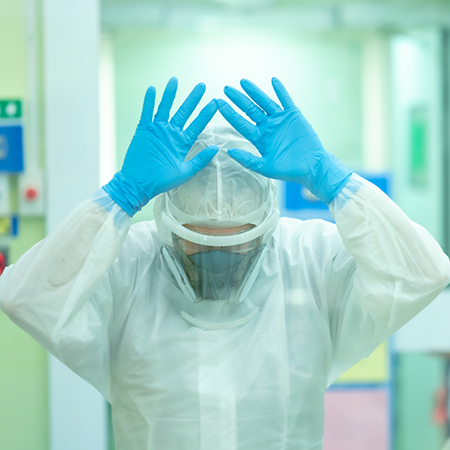The eighth survey of fellows and members of the Royal College of Physicians (RCP) has revealed the extent of the pressures placed on doctors by the COVID-19 pandemic. Almost one fifth (19%) said they have sought informal mental health support during the pandemic, while 10% said they had sought formal mental health support from either their employer, GP or external services.
While one third of doctors report feeling supported (35%) and determined (37%), the majority (64%) feel tired or exhausted, and many are worried (48%). Despite 85% of doctors reporting having had the first dose of a vaccine, only 16% have had both doses. Over half (58%) are either very worried or slightly worried about having to wait 12 weeks for their next jab, an issue which has caused considerable anxiety within the profession.
In addition, 56% are very concerned about the impact of rising COVID-19 admissions on their organisation’s capacity to deliver safe and effective care. Improvements in treatments mean that in this second wave a much smaller proportion of hospitalised patients are requiring ventilation in Intensive Treatment Units (ITU). This, however, is placing huge pressure on the wider medical team in all specialties, particularly respiratory medicine. In some hospitals, up to 95% of COVID-19 patients are receiving care outside of Intensive Care Units on medical wards acting as Covid wards. 20% of physicians have been redeployed during this wave, most to these COVID-19 wards.
The rapid rise in cases is being felt by doctors across the NHS from emergency departments to general COVID-19 wards and ICU. Delays to treatment in other areas of medicine due to the prioritisation of COVID-19 patients are also being acutely felt.
Although the pandemic brings unprecedented pressure, the RCP considers understaffing to be the root of many of these problems, with 55% of consultant posts unfilled even prior to the pandemic. The RCP has long called for the number of medical school places to double in order to grow the medical workforce and this month published a costed blueprint for making this happen.
Professor Andrew Goddard, president of the Royal College of Physicians, says: “There is no way to dress it up – it is pretty awful at the moment in the world of medicine. Hospital admissions are at the highest ever level, staff are exhausted, and although there is light at the end of the tunnel, that light seems a long way away.
“I am extremely concerned about the mental health of frontline doctors, who may be suffering from burnout and a feeling of not being valued. I'm not sure that before the pandemic many physicians would have contemplated that they might need formal mental health support in their career.
“Staff will be in desperate need of a break and will need specific time away if they’re to be at their best after the pandemic.
“Doctors have demonstrated remarkable resilience throughout the pandemic, working under the most challenging conditions the NHS has ever faced, but they can’t continue working this way forever. Workforce shortages need to be urgently addressed post-pandemic if we’re ever to reduce the immense pressure on NHS staff and ensure that they are prepared and supported to get the NHS back on an even keel.”
Although this news item focuses on doctors, HEFMA is aware that mental health of NHS staff across all roles is a growing concern, as are issues such as burnout and exhaustion. In the March/April issue of the Pulse Magazine, we will feature mental health as a special topic. Please do get in touch via the contact us form on this website - select editorial coverage from the drop-down menu - or comment on this thread, if your Trust is taking any special steps to look after the mental health of staff.











